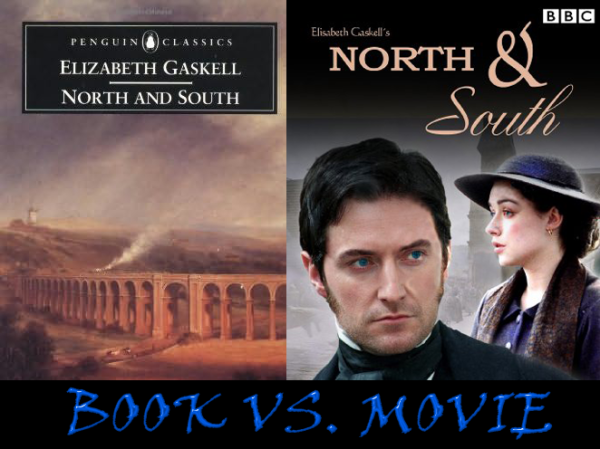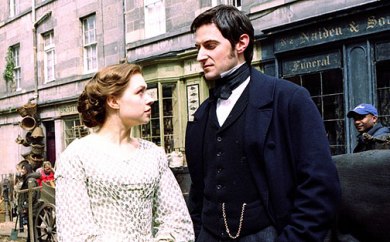Many of you have watched the 2004 BBC production of North and South starring Richard Armitage and Daniela Denby-Ashe. If you’re like me, you enjoyed it and wanted more. Although the 4-part miniseries is truly long to watch in one sitting, it has so much to love. I’ve watched it many, many times.
But after watching it for the 35th time, I still had questions. What does “I did not notice the color of this fruit” even mean? Did Margaret and Mr. Thornton really meet on the train platform? Seems awful convenient. And did Mr. Thornton truly beat up the smoker employee?
To answer these questions, I turned to the original text, written by Elizabeth Gaskell in 1854. For those of you casual readers, stick to the movie. There is a lot to weed through in the book, and this is one of those texts that could really stop you from reading all together. Although I enjoyed finding answers to my questions, this is not a light read. It’s filled with long passages of social commentary and sometimes even preaching. So this review is less about the book and more about the differences between the book and the movie for those of you who enjoyed the BBC adaption. Still, I don’t wish to diminish Miss Gaskell’s talent in weaving a story, for her text inspired what came to be on screen. So, thank you Elizabeth for giving us something to ponder about.
Things missing from the book, that I loved in the movie:
- Last train scene…this happens instead in a room alone.
- London Expedition scene…never happened.
- Miss Latimer…not in the book. No one is ever in Mr. Thornton’s heart but Margaret.
- “Look back at me” scene. This is just a little glimpse of what Thornton feels in the book.
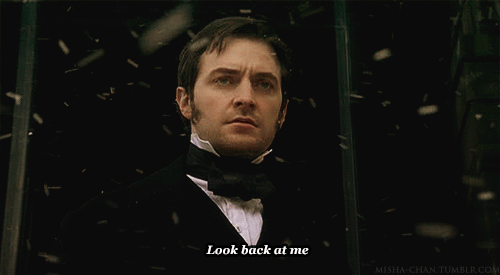
Things I did not like about the book vs. what happened in the movie:
- The Point of View in the novel is all over the place. It is not written in the modern way, where one person’s view is all you see, especially without scene breaks. This is good in one respect because you get to know what Mr. Thornton thought on several occasions and this was fun, but it’s rather tedious for those of us used to single POV books.
- Margaret is rude to Mr. Thornton without a cause. Perhaps this is why the movie shows Mr. Thornton beating the smoking employee, to give her cause. In the book, it is simply snobbery on her part. He is not seen beating anyone. Margaret and Mrs. Hale are very against workmen and masters. They even have a funny discussion about “factory slang” as they call it after Margaret uses the phrase, “Slack of Work.”
“Oh momma! Don’t try and make a bugbear of Aunt Shaw…Edith picked up all sorts of military slang from Captain Lennox, and Aunt Shaw never took any notice of it.”
“But yours is factory slang!”
“And if I live in a factory town, I must speak factory language when I want it.” - Higgins was much more brash and alcoholic. He seemed crazy and drunkard in the book. He’s mean and lashes out at Margaret and Mary. There was even a large section when Margaret brings him to Mr. Hale and they sit trying to talk to him when he’s drunk. This goes on for hours. He is painted as some stupid workman who drinks every time he doesn’t get his way. I much rather like the Higgins in the movie.
- The “bro-mance” between Higgins and Mr. Thornton is one of my favorite things about the film. In the book it is there, but with much less luster than in the movie.
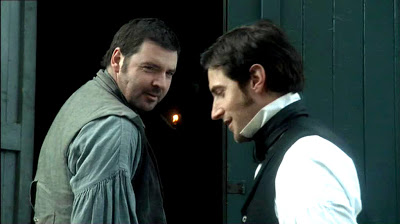
- I’m not sure if most people back in these days didn’t know what Unions were all about and the differences between masters and workers, and needed to explanations, but parts of this book read like voting ballot instructions. Dry commentary on the pros and cons run for pages upon pages. This is something romance readers will not enjoy.
Things I liked about the book vs. the movie:
- From the very beginning, Margaret is the “adult” in the book. When her father decides to leave Hellstone, he asks her to tell her mother “because he can’t bear it” and promptly leaves for the day on rounds. So, it is up to Margaret to break the sad news that they will be moving to Milton. The mother is ailing from the beginning and has been told to go to the sea, but instead they move to Milton. So, it’s not so much that Mrs. Hale hates Milton, only that she has been told and believes she will feel better if she goes to Bath. Margaret is also the adult with the mother. She complains and cries to her, but will never do so to Mr. Hale. What a marriage! A little conversation would have done them well. I don’t like that Maragret has to be the adult, but it explains a lot about the dynamics of their family shown in the film.
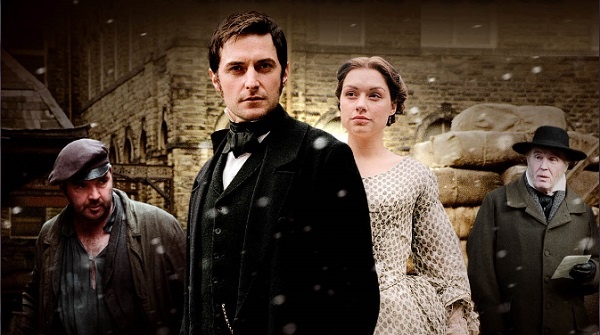
- I love the way Thornton observes Margaret. You can get a sense of his attraction to her and you really see why he loves her. There is one passage in particular when he is watching her serve tea. This is hinted at in the movie when their fingers touch as she hands him the cup. In the book, he is watching a bracelet she has on that keeps falling down. He is amused by and fascinated with her pushing it back up. “There it goes again,” he thinks. And the attentiveness of Mr. Thornton’s gaze in this scene of the movie makes much more sense if you know what he is thinking. Passages such as, “…blinded by his baffled passion” and “he was in the Charybdis of passion” kept me reading.
- The proposal scene in the book showed much more passion than the movie. Perhaps because it was being written by a woman and the script adjusted through male eyes? These words…
“To one whom I love, as I do not believe man ever loved woman before.”
And after she rejects him, this passage,
“For all his savage words, he could have thrown himself at her feet, and kissed the hem of her garment.”
- The book proposal is much more reminiscent of Pride and Prejudice. They could be written by the same author, they are so close. Margaret is so full of prejudice against Mr. Thornton that she has placed on him herself because of her close-minded views. Mr. Thornton is a less pride-filled Darcy in his acceptance that Margaret is so much above him, for in his eyes, she is a goddess. At the end of this proposal, before he leaves, to walk-a spurned, angry man-he tells her,
“You look as if you thought it tainted you to be loved by me. Nay, I, if I would, cannot cleanse you from it. But I would not, if I could. I have never loved any woman before: my life has been too busy, my thoughts too much absorbed with other things. Now I love, and will love, but do not be afraid of too much expression on my part.”
Sound familiar?
“Be not alarmed, madam, on receiving this letter, by the apprehension of its containing any repetition of those sentiments or renewal of those offers which were last night so disgusting to you.” ~ Pride and Prejudice, Jane Austen
- Margaret’s description of Mr. Thornton.
“He looks like a person who would enjoy battling every adverse thing he could meet with-enemies, winds, circumstances. The more it rains and blows, the more certain we are to have him.”
- After Margaret talks to the policeman, and tells her lie, she passes out in the hall. She’s lying there for some time and no one ever notices. I guess this is a comical scene that wouldn’t have done well in the movie, but it did crack me up.
- Seeing Thornton’s torture. Why do we love to see male characters tortured with their love for us? Because we tend to torture ourselves with loving that we cannot have and we like to see them feeling this same thing!
“She could not care for him, he thought, or else the passionate fervor of his wish would have forced her to raise those eyes.”
”She had such power to move him from his balance.”
- After Mrs. Hale dies, Mr. Hale is a basket case. In the movie he seems so removed from the occurrence, which brings in some of the book’s attitude about the dad from the beginning, but I liked seeing that he was affected.
- Not that I would change the movie ending on the train platform, because that was just awesome, but in the book, their last meeting is much different. Margaret, Mr. Thornton, and Henry Lennox are supposed to meet to go over some business, but Henry doesn’t make it.
“No one ever knew why Mr. Lennox did not keep his appointment on the following day. Mr. Thornton came true to his time.”
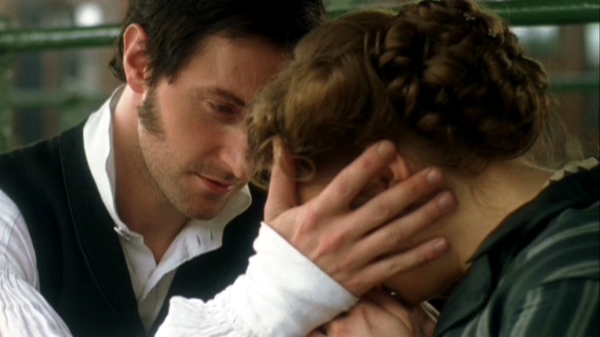 And he found only Margaret, leading to the best resolution ever, most of it covered in the movie. But here are some things we missed.
And he found only Margaret, leading to the best resolution ever, most of it covered in the movie. But here are some things we missed.
“Her very heart-pulse was arrested by the tone in which Mr. Thornton spoke. His voice was hoarse and trembling with tender passion as he said, “Margaret.”
“He knelt by her side, to bring his face to a level with her ear and whispered out the words, “Take care-if you do not speak-I shall claim you as my own in some strange presumptuous way. Send me away at once if I must go.”
“He laid her arms as they had once before been placed to protect him from rioters. “Do you remember, love? And how I requited you with my insolence the next day?”
Oh…so that’s what that meant. Explanations.
- In the movie, Mr. Thornton says, “I’d not noticed the color of this fruit.” And then later… “One moment we speak of fruit, the next of love.” This seemed very forced to me. I felt like he brought up the fruit simply so he could say the next words. Well, in the book, this is not how the scene plays out. In fact, nowhere in the proposal scene is fruit or talk of fruit, or thought of fruit. However, I think I know where the script writer was going with this. In the book, when it is discovered by Mr. Thornton that Mrs. Hale is ill, he asks if he can do anything to ease the suffering of his love’s mother. The doctor protests, but at last gives him a crumb…He should buy fresh fruit to send to her. Consuming the fresh fruit, the doctor says, will help her, if just a little. Is this what the script writer was getting at? I have to confess that I wish more of the original proposal scene would have been kept instead of inserting this confusing business about fruit when it was so strained to put in the scene.
- It is further explained in the book that Mr. Bell is a Milton man…but wants nothing of it. There is no explanation of why Mr. Bell has property in Milton in the movie, but the book explains it quite well.
“Are you not a Milton man yourself?” asked Margaret. “I should have thought you would have been proud of your town.”
“I confess I don’t see what there is to be proud of. If you’ll only come to Oxford, Margaret, I will show you a place to glory in.”
This passage explains a little more about why Mr. Bell and Mr. Thornton are at odds. It is also explained in the book that Mr. Bell wants Margaret as his own and when he finds Thornton has his sights on her, he is not happy.
- In the book, Mr. Thornton believes the man he sees her out at night with to be Mr. Henry Lennox, her lover, because of what Mr. Bell says. Mr. Bell makes it seem as though Henry and Margaret are together. This adds fire to the dangerous thoughts Thornton has when thinking of that night he saw her by the train with the unknown man. We know that it was her brother, but Mr. Thornton doesn’t find that out until much later when Higgins tells him.
- Margaret is torn apart by the thought of Mr. Thornton thinking she’s lying for a lover. She wants to tell him, almost does, but Fredrick is still in England and she is scared he will cause him to be caught. She tries to get Mr. Bell to tell Thornton, but he botches it.
So there you have it, the movie-lovers review of a book that inspired the awesome mini-series North and South. Do you agree? Have you read the book? What is your favorite part of the movie? What are your thoughts on the book? Let me know in the comments below.

